 August 24,
2020. The Director
General of
the Physical
Education and
Sports Department,
Dr. Alaa Abdel Qader
Niema from the Iraqi Ministry
of Youth and Sports, has granted
Adnan Adeb Mizher, one
of our graduates, with a work
permission. The specialists
center for kinetics and physical
training has acknowledged Adnan
for inventing an innovative
device and he received an
invention certificate. Adnan has worked with
German and American universities
and has published
scientific papers there. Which
is why he was granted permission
to practice his work in
kinematics at his center. Adnan
founded the first center in
the Middle East. He currently
has 5 people working with his
philosophy and have treated
more than 1,500 patients since
May 2019.
Adnan Adeb Mizher has
completed a Doctorate program
in Health Sciences at Atlantic
International University.
August 24,
2020. The Director
General of
the Physical
Education and
Sports Department,
Dr. Alaa Abdel Qader
Niema from the Iraqi Ministry
of Youth and Sports, has granted
Adnan Adeb Mizher, one
of our graduates, with a work
permission. The specialists
center for kinetics and physical
training has acknowledged Adnan
for inventing an innovative
device and he received an
invention certificate. Adnan has worked with
German and American universities
and has published
scientific papers there. Which
is why he was granted permission
to practice his work in
kinematics at his center. Adnan
founded the first center in
the Middle East. He currently
has 5 people working with his
philosophy and have treated
more than 1,500 patients since
May 2019.
Adnan Adeb Mizher has
completed a Doctorate program
in Health Sciences at Atlantic
International University.
 September
1, 2020. One
of our graduates,
Syeda
Shahper, has
published
another paper,
titled Praise and Beauty
of Islamic Heritage “Mosque’s
architecture and decorative
designs”, in Academia.edu
Summary: Islamic architecture
has a wide range of
secular and religious buildings
from the early history of Islam
to the present day. Islamic
architecture is influenced from the other lands which
they conquered. These historical
buildings are the symbol
of Islamic greatness and glory.
These buildings have a wide
range, but the significance of
Mosque is undeniable.
From the beginning of
Islam, the institution of
Mosque has been playing the
central role in the Muslim
community.
The rise of the architecture
work started with the rule
of Mughal in subcontinent,
which has no fall till now a
day. The Wazir Khan Mosque situated in Lahore Punjab
Pakistan is a masterpiece of
Mughal era. In his architecture
we see civil engineering and
fine arts are combined. After
the 500 years of his completion
it is, as it. It’s a complete
school of design. ...
Download her paper
here:
https://www.academia.
edu/43766679/Praise_and_Beauty_
of_Islamic_Heritage_Mosques_architecture_
and_decorative_designs_by_
Syeda_Lubna_Shahper_Grade_A_
Syeda Shahper has completed
a Doctorate program in
Fine Arts at AIU.
September
1, 2020. One
of our graduates,
Syeda
Shahper, has
published
another paper,
titled Praise and Beauty
of Islamic Heritage “Mosque’s
architecture and decorative
designs”, in Academia.edu
Summary: Islamic architecture
has a wide range of
secular and religious buildings
from the early history of Islam
to the present day. Islamic
architecture is influenced from the other lands which
they conquered. These historical
buildings are the symbol
of Islamic greatness and glory.
These buildings have a wide
range, but the significance of
Mosque is undeniable.
From the beginning of
Islam, the institution of
Mosque has been playing the
central role in the Muslim
community.
The rise of the architecture
work started with the rule
of Mughal in subcontinent,
which has no fall till now a
day. The Wazir Khan Mosque situated in Lahore Punjab
Pakistan is a masterpiece of
Mughal era. In his architecture
we see civil engineering and
fine arts are combined. After
the 500 years of his completion
it is, as it. It’s a complete
school of design. ...
Download her paper
here:
https://www.academia.
edu/43766679/Praise_and_Beauty_
of_Islamic_Heritage_Mosques_architecture_
and_decorative_designs_by_
Syeda_Lubna_Shahper_Grade_A_
Syeda Shahper has completed
a Doctorate program in
Fine Arts at AIU.
 September, 2020. These graduate students completed the majority of the requirements to obtain
honors, which included a 4.0 GPA, published works, recommendation from their respective
advisors, patent a product, etc. Congratulations to all of them!
CUM
September, 2020. These graduate students completed the majority of the requirements to obtain
honors, which included a 4.0 GPA, published works, recommendation from their respective
advisors, patent a product, etc. Congratulations to all of them!
CUM
 September 9, 2020. AIU is
proud to share with you another
video about one of our
students who breaks paradigms.
The AIU student is Dr. Joel Ramos Leyva who graduated
with a Doctorates degree
in Education Administration
from AIU. He has great experience
in the educational administration
field and
is the cofounder
of
the CINADE
“Centro de
Investigacion
para la
Adminstracion
Educativa”
which offers Masters and Doctorates
degrees in both of its campus
locations in Mexico.
Watch the video here:
https://atlanticinternationaluniversity.screencasthost.com/watch/cYQeqjH0gi
May you enjoy and be inspired
by this video.
September 9, 2020. AIU is
proud to share with you another
video about one of our
students who breaks paradigms.
The AIU student is Dr. Joel Ramos Leyva who graduated
with a Doctorates degree
in Education Administration
from AIU. He has great experience
in the educational administration
field and
is the cofounder
of
the CINADE
“Centro de
Investigacion
para la
Adminstracion
Educativa”
which offers Masters and Doctorates
degrees in both of its campus
locations in Mexico.
Watch the video here:
https://atlanticinternationaluniversity.screencasthost.com/watch/cYQeqjH0gi
May you enjoy and be inspired
by this video.
 September
15, 2020. One
of our graduates,
Esther
Coronel de
Iberkleid, has
published
another book called, Guide of
how to improve the performance
of employees in companies:
Aimed at entrepreneurs,
micro entrepreneurs,
small, medium and large
companies and authorities
(Spanish Edition) on Amazon.
Summary: After 30 years
of work, related to different
companies, I realized that there was a background that
could serve other entrepreneurs
to take advantage of it,
derived from my work experience
both in my own company
and in other companies.
For years I heard that entrepreneurs
had many problems
caused by the so-called “high
turnover of staff”, which represented
huge expenses.
In addition, they were very
frustrated that no attention
was paid to training and
training that also represented
a high cost to companies, but
did not finish solving problems.
I wondered why and in specific cases I helped resolve
several issues successfully.
I realized that there was, at
first, a clear methodology for
training and training employees
in specific areas. There
were companies where new
employees were told to look
and learn to replicate it. ...
Find the book in Kindle or
Paperback version here:
https://www.amazon.com/dp/B08HKK2Y3C
Esther Coronel de Iberkleid
has completed a Doctorate
program in Business Project
Management, Education and
Personal Development at Atlantic
International Universit
September
15, 2020. One
of our graduates,
Esther
Coronel de
Iberkleid, has
published
another book called, Guide of
how to improve the performance
of employees in companies:
Aimed at entrepreneurs,
micro entrepreneurs,
small, medium and large
companies and authorities
(Spanish Edition) on Amazon.
Summary: After 30 years
of work, related to different
companies, I realized that there was a background that
could serve other entrepreneurs
to take advantage of it,
derived from my work experience
both in my own company
and in other companies.
For years I heard that entrepreneurs
had many problems
caused by the so-called “high
turnover of staff”, which represented
huge expenses.
In addition, they were very
frustrated that no attention
was paid to training and
training that also represented
a high cost to companies, but
did not finish solving problems.
I wondered why and in specific cases I helped resolve
several issues successfully.
I realized that there was, at
first, a clear methodology for
training and training employees
in specific areas. There
were companies where new
employees were told to look
and learn to replicate it. ...
Find the book in Kindle or
Paperback version here:
https://www.amazon.com/dp/B08HKK2Y3C
Esther Coronel de Iberkleid
has completed a Doctorate
program in Business Project
Management, Education and
Personal Development at Atlantic
International Universit
 Call for Papers
This Conference will be held
5–6 May 2021 at University of
the Aegean —Rhodes Campus,
Rhodes, Greece.
We invite proposals for paper
presentations, workshops/
interactive sessions, posters/
exhibits, colloquia, focused
discussions, innovation
showcases, virtual posters, or
virtual lightning talks.
2020 Special Focus:
“Transcending Social
Distance: Emerging Practices
in e-Learning”
Theme 1: Considering digital
pedagogies.
Call for Papers
This Conference will be held
5–6 May 2021 at University of
the Aegean —Rhodes Campus,
Rhodes, Greece.
We invite proposals for paper
presentations, workshops/
interactive sessions, posters/
exhibits, colloquia, focused
discussions, innovation
showcases, virtual posters, or
virtual lightning talks.
2020 Special Focus:
“Transcending Social
Distance: Emerging Practices
in e-Learning”
Theme 1: Considering digital
pedagogies. 
| Igor Giovanni de Sousa e Silva Master of Business and Economics Business Management Angola |
Carlos Fernández Gámez Bachelor of Science Psychology Argentina |
Edinah Mandizwidza-Moyo Doctor of Business Administration Marketing Strategy Botswana |
Nhora Aust Bachelor of Arts Legal Studies Canada |
Wilson, Arthur Nwabufo Bachelor of Education Education Leadership Canada |
Laura Raquel Robles López Bachelor of Arts English and Spanish Literature China |
| Nhora Cárdenas Puyo Doctor of Education Education Colombia |
Jose Domingo Millan Martinez Bachelor of Science Civil Engineering Colombia |
Juan Manuel Ángel Reinemer Doctor of Business Administration Business Strategy Colombia |
Amauris Tomas Pereira Escobar Bachelor of Science Mechanical Engineering Colombia |
Ricardo Alonso Valderrama Carvajal Bachelor of Psychology Humanities Colombia |
Helene Mwamba Milongo Bachelor of Business Administration International Relations Congo |
| Itoua Ngondzi Doctor of Science Industrial Engineering Congo |
Tatiana Maksimenko Bachelor of Science Psychology Dominican Republic |
Máxima Méndez Rosa Doctor of Science Mathematics Dominican Republic |
Mariluz Arias Eusebio Doctor of Accounting Acc ounting Dominican Republic |
Randy Manuel Abreu Paulino Master of Accounting Acc ounting Dominican Republic |
Paola Patricia Lafontaine Bachelor of Education Education Dominican Republic |
| Emiliano Antonio Morel Domínguez Bachelor of Architecture Building Construction Management Dominican Republic |
Esther Milagros Rincón Caminero Master of Psychopedagogy Psychopedagogy Dominican Republic |
Edison Favio Arciniegas Paspuel Master of Business Administration International Business Ecuador |
Marco Fernando Bermeo Guadalupe Master of Legal Studies Legal Studies Ecuador |
Andrea Vanessa Zapata Sánchez Bachelor of Science Forensic and Child Psychology Ecuador |
Maria Lorena Espinoza Groenow Bachelor of Science Psychology Ecuador |
| José Roland Castillo Montoya Bachelor of Science Industrial Engineering Ecuador |
Enrique David Ramos Parra Bachelor of Science Electromechanical Engineering Ecuador |
Alejandro Ona Owono Nchama Doctor of Legal Studies Aeronautics Legal Studies Equatorial Guinea |
Rodolfo Ondo Mba Nchama Master of Science Petroleum Engineering Equatorial Guinea |
Othman A.Q. Sheriff Bachelor of Comm unications Mass Media and Communications Germany |
Bernard Agyemang - Duah Master of Business Administration Business Administration Ghana |
| Dorothy Denson Doctor of Philosophy Counselling Psychology Ghana |
SPECIAL GROUP GUATEMALA Bachelor of Business Administration Administration Mario Rolando Amaya Galindo Dirian Lorena Reyes Pandy Andrea Lissette Estrada Peralta Bardy Jonelle Allen Dondiego Byron Rafael Santizo Hernandez Carlos Humberto Rivera Chévez Edgar Ronaldo Dominguez Estrada Eligio Rosado D´Arcy Heber Isaí Ramírez Madrid Hugo Eduardo Tistoj Izaguirre Jeimy Paola Santizo Pérez Jonathan W. Arenales Quintanilla José Guillermo Pérez Hernández José Miguel Méndez Funes Juan Carlos Tzunun Hernández Kevin Ruiz Laroj Luis Orlando Navas Vásquez Mario Augusto Colindres Ramírez Mario José Valdéz Cifuentes Mario Rolando De La Cruz Herrera Martha M. Magdalena Espinoza Rivera Olga Josefina Hernández de León Raul Filadelfo Toledo Juárez Richard Thomas Bowen Herrera Sergio Orlando Escobar Pérez Sheyli Julissa Flores Mora Tania Elizabeth Cuyún Vasquez Wilder Arnoldo Cobón Román William Arnoldo Mazariegos Ramírez Williams Oswaldo Zúñiga García Yennyffer Noemy Blanco López Yordi Alejandro Velasquez García |
Antalov Delano Vidyanand Jagnandan Master of Science Mathematics Guyana |
Shawn Anshuman Jagnandan Master of Science Mathematics Guyana |
Sandra Beauvil Bachelor of Business Administration International Business Haiti |
Nohemy Maldonado Andara Bachelor of Business Administration International Business Honduras |
| Fidel Ángel Bardales Hernández Bachelor of Science Psychology Honduras |
Jeyasekhar M. Amalorpam Chellathurai Doctor of Science Chemical Engineering India |
Bagzhan Sagynbek Rafikuly Bachelor of Science Information Technology Kazakhstan |
Elijah Onyancha Master of Theology Theology Kenya |
Itumeleng Eugenia Masheane Certificate of Science Healthcare Administration Lesotho |
Gemane Gedaliah Getteh Doctor of Philosophy Psychology Liberia |
| Praveen Obeegadoo Doctor of Arts Interior Design Mauritius |
Jaime Diego Montenegro Ernst Doctor of Economics Public Policy Mexico |
Julio Henrique Nhacubangane Bachelor of Science Electrical Engineering Mozambique |
Merdan Nazarov Bachelor of Literature English Language and Literature Myanmar |
Larai Wazhi Aku-Akai Master of Science Public Health Namibia |
Reshma Amin Fateh Master of Science Psychology Netherlands Antilles |
| Arlene de Fatima Salgado Gomez Bachelor of Science Psychology Nicaragua |
Nosakhare Anderson Omoregie Doctor of Business Administration International Business Nigeria |
Akubue Augustine Uchenna Doctor of Philosophy Health Policy Economics Nigeria |
Mike Baah Stephan Barido Bachelor of Science Architecture Nigeria |
Ogungbaroye Remilekun Elizabeth Master of Science Software Engineering Nigeria |
Udochukwu U. Nwibani Doctor of Science Legal Studies Nigeria |
| Jhilmar Francisco Fernandez Mejia Bachelor of Science Environmental Science Peru |
Illanie Laca Nicoll Bachelor of Education Education Peru |
Alfredo Emilio Corrales Rosas Doctor of Public Administration Public Administration Peru |
Fadi AbuAita Doctor of Philosophy Hospitality Management Poland |
Edison Parés Atiles Doctor of Philosophy Electrical Engineering Puerto Rico |
Gidimadzor Agnes Amakie Bachelor of Science Business Administration Senegal |
| Bob Misheck Koker Master of Science Land Surveying Sierra Leone |
Ho Lien Chun Wilson Doctor of Business Administration Business Administration Singapore |
Christina Doe Bachelor of Education Early Childhood Education South Korea |
Vera Champagne Doctor of Business Administration Business Administration Spain |
Thokozani M Nkambule Doctor of Philosophy Finance Swaziland |
George Andrew Pindua Doctor of Philosophy Human Resources Management Tanzania |
| Fatma Kurtlar Bachelor of Arts Human Behavior Turkey |
Kyeyune Dorothy Delilah Doctor of Business Administration Business Administration Uganda |
Osvaldo Joao Fernando Baptista Maiala Bachelor of Comp uter Science Information Technology United Kingdom |
Martina Fabricci Master of Science Molecular Biology and Biotechnology United Kingdom |
Mayda Silva Doctor of Psychology Clinical Psychology USA |
Claudia Lorena Martínez Castellanos Bachelor of Science Chemical Engineering USA |
| Abdulai Bah Master of Business Administration Business Administration USA |
Arianna S. Ringrose Bachelor of Science Sports Nutrition and Health USA |
Yael Yarimi Kirshenberg Doctor of Philosophy Journalism USA |
Martha Mutonono Master of Business Administration Business Administration USA |
Nelsy Amelia Ortiz Ramirez Bachelor of Business Administration International Commerce USA |
Alejandra Varela Pinela Master of Physiotherapy Occ upational Physiotherapy USA |
| Ignacio Marcelo Ortiz Bachelor of Agriculture Engineering Mgmt. of Tropical and Subtropical Crops USA |
Eugene Belilovsky Doctor of Philosophy Psychology USA |
Juan M Martinez Robles Bachelor of Science Civil Engineering USA |
Olalekan Olajide Olasiyan Doctor of Business and Leadership Leadership USA |
Ryan Jermaine Samuels Certificate of Management Facilities Management USA |
Joseph Mwabalengile Bachelor of Science Mining Engineering Zambia |
| Martha Sahuku Bachelor of Business and Economics Procurement and Supp ly Management Zambia |
Mutale Nkonde Bachelor of Social and Human Studies Social Work Zambia |
Gladys Z M Banda Bachelor of Business Administration Leadership Zambia |
Osward Marara Doctor of Business Administration Business Management Zimbabwe |
||

 Michael Ogunfowora
Michael Ogunfowora
 Orinthia Fisher-Howe
Orinthia Fisher-Howe
 Pindua Rev. George A
Pindua Rev. George A
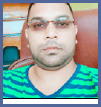 Shawn Jagnandan
Shawn Jagnandan

With the ease of access
to the Internet, a new
mode of communication, has
developed which is the platform
of social networks. They have
a real hold on their members
whose figures amount to around
1.5 billion. As surprising as it
seems, with web 2.0 which
makes it very easy to share a
good amount of personal data,
the use of the Internet is a
legal framework that protects
privacy. Benoît Sillard (2011, 201) expresses “fears of control
by all by all”, in an environment
where social digitalization is
very accelerated. The context
of the web, with its 1 billion
200 million Internet users
connected to the only social network Facebook, which
alone represents “a virtual
continent” according to Guy de
Felcourt (2011, 50) with more
than 175 million tweets that are
posted every day! The places of
connection to social networks
are increasing with cars connected
by wifi to the Internet
and public spaces now having
free access connections
Internet users, who are often
characterized by belonging to
more than one of these social
networks, are more exposed to
infringements of their rights
because of the entertainment
of interactions in various
digital spaces. These attacks
are more a result of human
vulnerability than security
breaches, conducive to identity
theft. It is at this time that
the problem of regulation arises
which seems to be a sector
not sufficiently equipped for
the repression of the accused,
It is more than imperative to
make a legal education which
frames the freedom of expression
on the net
The notion of responsibility
in relation to the acts
performed must be the center
of reflection for the users of
these spaces of free expression.
The law in its role must
define the contours of the
acceptable and the unacceptable
within the framework
of this new culture of social
ties. Will it not be useful to
already define the framework
of responsibility in the use of
digital spaces? What are the
legal approaches related to
Internet law, on the one hand
to the protection of privacy,
on the other to the protection
of personal data and finally
to the security of systems and
data? What charter should
govern the use of social networks
for a framework for the
use of social media?
Body of Assignment
Before we get to the heart
of the matter it is important
to define the key terms which
constitute the basis for this
reflection.
A digital space: It means
an integrated set of digital
services chosen and made
available to all stakeholders
in a community within a
framework of trust defined by
a master plan. It constitutes a
unified entry point allowing
the user to access, depending
on their profile and level
of authorization, their digital content and services. It offers
a place of exchange and collaboration
between its users,
and with other communities
in relation to the school or the
establishment. (Wikipedia)
Or: a digital space is the
online service accessible from
any browser connected to the
Internet which assembles the
digital services adapted to the
categories of users: get information,
produce information,
consult resources, organize
your work, communicate,
work alone or in a group,
learn, support the education of
your children. (Wikipedia)
A network is a set of interconnected
objects brought
together by their information
exchanges.
A social network: It is more
specifically a set of individuals
and organizations linked by
social interactions, during collaborative
processes. (Popular
definition)
Moral responsibility. It is
the need for a person to answer
for his intentions and his
actions before his conscience.
the use of digital spaces
As much as the digital space
is meant to be a space for free
expression, there are also
drifts due to the misuse of certain,
going so far as to commit
acts reprehensible by law.
Only it happens to be that
the digital space presents according
to certain countries
gaps which give free rein to a
debauchery which is synonymous
with real crime.
Cybersecurity frames the
domain of freedoms in the
digital space, except that
this hidden freedom behind
pseudonyms is transformed
into a cyber crime which seriously
harms the privacy of
other internet users.
This is how it is important to
convene the concept of legal
responsibility when any activity
aimed at tarnishing the
image of a third party, a State,
a company in the digital space.
Legal approaches
related to Internet law
On the one hand to the protection
of privacy, on the other
to the protection of personal
data and finally to the security
of systems and data
Some avant-garde countries
have already equipped themselves
with a legal framework
which legislates the use of the
digital space. There is a clear
understanding of the concept
of responsibility as for any
violator of the pre-established
laws. However, there are still
users accustomed to reprehensible
acts giving themselves
to serious acts of nuisance
towards others. However, their
package never goes unpunished
because of the use of
pseudonyms or virtual out ls
which camouflage them during
their package.
Nowadays there are in addition
to legal texts, there are the
qualified personnel to trace
any contravening with the respect
of the laws which frame
the use of the digital space.
In order not to be complicit
in their packages, the administrators
of social networks,
a free digital platform on the
web, now display a charter
which commits any violation
of the code of ethics to the use
and respect of the privacy of
third parties. The use of social
networks is not based on any
security which guarantees
respect for data belonging to
others. reason for which the
notion of responsibility must
be reinforced by a reprehension
of the judicial systems of
each country.
Thus, any person found
guilty of disseminating false
information, disclosing the
secrets of a public or private
structure without authorization,
publication of images
detrimental to the honor of
a third party; falsification of
documents for use in personal
interests etc must the subject
of the sactions. A coalition of
states from the same community
must establish a policy
of solidarity for assistance in
case of need to track down
offenders.
What charter should govern
the use of social networks for
a framework for the use of
social media?
Regarding the charter of use
of digital space, it must comply
with respect for the privacy
of individuals and public
establishments in accordance
with the articles contained in
the current penal code.
These elements must be
clearly defined and put at the
disposal of the user with the
warnings as for the sanctions
incurred in case there is drift
on the behavior in the digital
spaces.
Conclusion
It is clearly recognized that
digital spaces offer a space of
expression which facilitates
exchanges. However, it is very
important to define the concept
of responsibility in order
to respect the use of this space
which serves as a framework
for meeting on a global scale.
And which to date represents
a significant lever for development.
An education based on
the respect of the rules will
make digital space a pleasant
framework to travel without
placing yourself, to learn without
necessarily resorting to
large expenses, to be informed
in real time about what is happening
in the world and many
other advantages offered by
this swimming space.
BIBLIOGRAPHY. Réseaux sociaux, responsabilité juridique et éducation
aux médias • Bruno Hénocque Dans Les Cahiers du numérique,
pages 63 à 91. 2014/2 (Vol. 10).

Science is the most beautiful
thought because it
allows us to get closer to the
wonderful world of which we
are part. It’s a work of dedication
and revision of all that we
are as human beings. We have
many explanations of the
physical world of which we are a part. We also review and
anticipate everything we are
as a culture and as a civilization.
Being a work of vision,
of proposals, of verification,
of exercises and exercises of
reason, it makes human beings
dedicated to it, builders of the
world that we know until now.
The disclosure of this type
of activity is recent; we know
that the universities within
their substantive functions
have that of the dissemination
of science. The terminology
that science has is what
gives it its character but at
the same time it becomes its difficulty for those who are not
specialists.
There is a difference between
common language and
scientific language. This difference
has been, many times
marked, on the one hand, by
the little dissemination that
was made of science, but at
the same time by the little
interest of society to know the
work of researchers.
From the Greek world we
know that all the objects of
study of science are not the
same: one thing is what has
to do with human beings and
another with nature.
The knowledge that science
provides is related to society,
the economy, history, philosophy,
human beings and
everything that makes up the
social and material world. Due
to their way of working, any
other explanation is useless
and wrong. People who use
the applications of science
study what the system is but
are far from its construction.
Nowadays we hear many
wanting to talk about science
but they’re lost in a field that
is not that of theories and
their foundation. Scientists
speak little of what they do, so
the works that explain what it
is to do science don’t have the
divulgation that they should
be. Scientists don’t have to
explain to each other what scientific
work is, hence, on this activity we find classic works
such as Karl Popper. Rather,
the works are written for those
who have to dabble in scientific
research.
Science is divided into:
Basic and Applied. Those
who work on its construction
develop in both fields: some
build the system and others
apply it for the benefit of
society.
The problem in the field of
science has been:
a) Identify what the object of
study is.
b) Checking for object type
c) The value of mathematics
d) The consideration of the
object of study outside its
environment.
e) The consideration of the
object of study in its integration
into the physical and
cultural world.
From the aforementioned aspects,
positions have emerged
throughout the history of science
that still determine.
We can see the jobs and
thinking in the following researchers:
Henri Poincaré (1854-1912)
Otto Neurath (1882-1945)
Ludwig Wittgenstein
(1889-1951)
Hans Reichenbach
(1891-1953)
Arthur Rosenblueth
(1900-1970)
Karl Popper (1902-1997)
Imre Lakatos (1922-1974)
Thomas S. Khun (1926-1996)
Paul Feyerabend (1924-1994)
Nowadays, to do any research,
whether you want to continue
in Positivism or not, for a good
research, you must enter the
holistic demonstration: demonstrate
to the object in the world
to which it belongs what interdisciplinarity
implies. That is
why there are no disagreements
about being a Positivist or not.
We still have followers of
quantification for which if
an investigation doesn’t have
a mathematical proof, the
knowledge that was intended
hasn’t been reached.
We know in this 21st century
that verification can be factual
and ideal. We also know that
we can’t consider the object of
study in isolation, so we have
to take interdisciplinarity very
seriously.
We live in a world where
the sciences that allowed the
creation of technology for marketing
and weapons to seek
peace from the generation of fear were given more importance.
Hence, the sciences in
which we see more production
are the so-called “hard
sciences”, such as physics
that needs mathematics for
quantification.
Mathematics has been
highly valued because it will
quantify the objects that are
wanted. We are aware of the
value that many think mathematics
has; a clear example
occurs, in many countries, in
the basic grades of education,
where children whose abilities
are oriented to other fields
of knowledge are paid little
attention.
Making history of the path
of science we have that we
are part of the Greco-Roman
culture. In the ancient world
we had a science only from
reasoning.
Modern science begins with
Galileo Galilei (1564-1642)
because he introduces experimentation
and mathematics.
With new ideas about the
method of doing science,
we talk about Isaac Newton
(1642-1727). Newton was
a follower of Aristotle for
his method of analysis and
synthesis.
One way of doing science,
which is maintained despite
its advancement, is Positivism
for which science is only about
observable and measurable
facts. For the Positivists, the verifiable refers to the quantity,
but today we know that
the verifiable has to be first of
the mind and after the factual,
if it is given.
In his classic work Science
with Consciousness Morin
says: “Scientific knowledge is
true knowledge, in the sense
that it is based on verified data
and is capable of providing
concrete predictions.” (Morin,
1984, p. 40)
The explanation that Morin
gives us refers to the fact
that scientists in their work
propose theories that demonstrate
and that new aspect of
what we call reality is reviewed
by the other members
of the scientific community
and the new theory must be
congruent with the system
that constitutes the science.
The recently deceased
Mario Bunge in Scientific
Research says: “Science is a
style of thought and action:
precisely the most recent, the
most universal and the most
profitable of all styles”. (Bunge,
2004. p. 19)
In relation to the knowledge
that science provides and everything
that many nowadays
say, Carl Sagan says: “We live
in a society that is extremely
dependent on science and
technology, in which almost
no one has minimal notions
about science and technology.”
(Sagan, 1994)
Nowadays we hear: scientific
method and it refers to
the positivist method.
We can mention all the
methods we want, but they all
have to be based on: a theory,
a demonstration, a check if the
object of study allows it, some
results and the application.
Having a society in which
everything is networks and
networks, there should be
more communication than
what does benefit society:
scientific work.
You can ask those with even
a Master’s degree which are
the popular science magazines and they don’t know. Ask
which artist had such behavior
and you will have very
detailed answers.
You can search the web for
many scientific journals because
currently there is a wide
publication because groups
such as the scientific community
and universities have
a commitment to disseminate
science.
In science there is no
other: it is demonstrated by
grounded reasoning and the
results are deduced from the
relationship with the supporting
theories.
BIBLIOGRAPHY. BUNGE, M. (2004). La Investigación Científica.
Barcelona: Ariel. | MORIN, E. (1984). Ciencia con Consciencia. Barcelona:
Anthropos. | SAGAN, C. (1994). USA: Cornell University.
 I suspect that just about all students
are in one of three instructional
modes [during this pandemic]:
• Completely face-to-face classes
with some type of social-distancing
limitations.
• Completely online (some people like
to call it remote) learning.
• Some type of hybrid model that
includes both in-person and remote
learning.
Here is some advice to make sure that
you (the student) get through this with
your education intact (hopefully).
1. Communicate and make connections.
The majority of students learn
by interacting with the instructor and
other students.
2. Don’t fall behind. The longer you wait to jump on the train, the
more difficult it gets, since the train is
not only farther away, but also going
faster. Do whatever helps you keep up.
3. Realize that instructors are in a
difficult position also. Just realize that
you might be stressed out about remote
[or social-distance] learning, and
your instructors are in the same boat.
4. Don’t take the easy path. It’s way
too easy to just Google the answer
and get past this test. But maybe you
should ask yourself, why are you in
this course? Is it for that letter grade
that you get at the end? Or is it to learn
something about the fundamental
nature of the universe? ...
Read full text:
I suspect that just about all students
are in one of three instructional
modes [during this pandemic]:
• Completely face-to-face classes
with some type of social-distancing
limitations.
• Completely online (some people like
to call it remote) learning.
• Some type of hybrid model that
includes both in-person and remote
learning.
Here is some advice to make sure that
you (the student) get through this with
your education intact (hopefully).
1. Communicate and make connections.
The majority of students learn
by interacting with the instructor and
other students.
2. Don’t fall behind. The longer you wait to jump on the train, the
more difficult it gets, since the train is
not only farther away, but also going
faster. Do whatever helps you keep up.
3. Realize that instructors are in a
difficult position also. Just realize that
you might be stressed out about remote
[or social-distance] learning, and
your instructors are in the same boat.
4. Don’t take the easy path. It’s way
too easy to just Google the answer
and get past this test. But maybe you
should ask yourself, why are you in
this course? Is it for that letter grade
that you get at the end? Or is it to learn
something about the fundamental
nature of the universe? ...
Read full text:
 It was a Viking saga written in genes.
In 2008, construction work on an
isolated Estonian beach near the town
of Salme uncovered the skeletons of
more than 40 powerfully built men.
They were buried around 750 C.E. in two
ships with Viking-style weapons and
treasure —apparently the aftermath of
a raid gone wrong. DNA from the bones
has now added a poignant detail: Four
of the men, buried shoulder to shoulder
holding their swords, were brothers.
The new data come from a massive
effort to sequence the DNA of Vikings
across Europe. The results, published
today in Nature, trace how the Vikings
radiated across Europe from their
Scandinavian homeland, and how
people with roots elsewhere also took
up Viking ways. “The big story is in
line with what’s told by archaeologists
and historians,” says Erika Hagelberg,
an ancient DNA expert at the University
of Oslo... “It’s the small details of
particular sites that are really compelling.”
The Estonian site, for example,
offers powerful evidence that the crew
was a tight-knit group from the same
village or town. “Four brothers buried
together is new and unique … [and]
adds a new dimension,” says Cat Jarman,
an archaeologist working for the
Museum of Cultural History in Oslo.
Read full text:
It was a Viking saga written in genes.
In 2008, construction work on an
isolated Estonian beach near the town
of Salme uncovered the skeletons of
more than 40 powerfully built men.
They were buried around 750 C.E. in two
ships with Viking-style weapons and
treasure —apparently the aftermath of
a raid gone wrong. DNA from the bones
has now added a poignant detail: Four
of the men, buried shoulder to shoulder
holding their swords, were brothers.
The new data come from a massive
effort to sequence the DNA of Vikings
across Europe. The results, published
today in Nature, trace how the Vikings
radiated across Europe from their
Scandinavian homeland, and how
people with roots elsewhere also took
up Viking ways. “The big story is in
line with what’s told by archaeologists
and historians,” says Erika Hagelberg,
an ancient DNA expert at the University
of Oslo... “It’s the small details of
particular sites that are really compelling.”
The Estonian site, for example,
offers powerful evidence that the crew
was a tight-knit group from the same
village or town. “Four brothers buried
together is new and unique … [and]
adds a new dimension,” says Cat Jarman,
an archaeologist working for the
Museum of Cultural History in Oslo.
Read full text:
 This fall, cardiologist Sam Mohiddin
will embrace a new role —that
of research subject. MRI scans of his
heart at St. Bartholomew’s Hospital
in London, where he works, will help
answer a pressing question: Do people
who suffered a mild or moderate bout
of COVID-19 months ago, as he did,
need to worry about their heart health?
Fears that COVID-19 can cause the
cardiac inflammation called myocarditis
have grown, as doctors report
seeing previously healthy people
whose COVID-19 experience is trailed
by myocarditis-induced heart failure.
Mohiddin recently treated 42-year-old
Abul Kashem, who had typical COVID-
19 symptoms in April, including
loss of smell and mild shortness of
breath. A month later, he fell critically
ill from severe myocarditis. “I’m just
grateful to be alive,” says Kashem, who
spent more than 2 weeks in an intensive
care unit. Why did this happen?
he wonders.
How the virus might damage heart
muscle is just one question researchers
are now probing. Other studies are following
people during and after acute
illness to learn how common heart
inflammation is after COVID-19, how
long it lingers, and whether it responds
to specific treatments. Researchers
also
This fall, cardiologist Sam Mohiddin
will embrace a new role —that
of research subject. MRI scans of his
heart at St. Bartholomew’s Hospital
in London, where he works, will help
answer a pressing question: Do people
who suffered a mild or moderate bout
of COVID-19 months ago, as he did,
need to worry about their heart health?
Fears that COVID-19 can cause the
cardiac inflammation called myocarditis
have grown, as doctors report
seeing previously healthy people
whose COVID-19 experience is trailed
by myocarditis-induced heart failure.
Mohiddin recently treated 42-year-old
Abul Kashem, who had typical COVID-
19 symptoms in April, including
loss of smell and mild shortness of
breath. A month later, he fell critically
ill from severe myocarditis. “I’m just
grateful to be alive,” says Kashem, who
spent more than 2 weeks in an intensive
care unit. Why did this happen?
he wonders.
How the virus might damage heart
muscle is just one question researchers
are now probing. Other studies are following
people during and after acute
illness to learn how common heart
inflammation is after COVID-19, how
long it lingers, and whether it responds
to specific treatments. Researchers
also
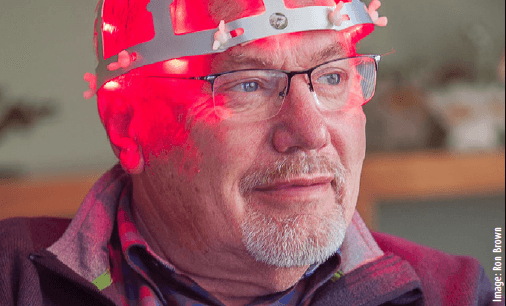 Light therapy can help lift moods,
heal wounds, and boost the immune
system. Can it improve symptoms
of Parkinson’s disease, too? A
first-of-its-kind trial scheduled to
launch this fall in France aims to find
out. In seven patients, a fiber optic
cable implanted in their brain will
deliver pulses of near-infrared (NIR)
light directly to the substantia nigra, a
region deep in the brain that degenerates
in Parkinson’s disease. The team,
led by neurosurgeon Alim-Louis
Benabid of the Clinatec Institute —a
partnership between several government-
funded research institutes and
industry— hopes the light will protect
cells there from dying.
The study is one of several set to
explore how Parkinson’s patients
might benefit from light. “I am so
excited,” says neuropsychologist Dawn
Bowers of the University of Florida
College of Medicine, who is recruiting
patients for a trial in which NIR
will be beamed into the skull instead
of delivered with an implant. Small
tests in people with Parkinson’s and
animal models of the disease have
already suggested benefits
Light therapy can help lift moods,
heal wounds, and boost the immune
system. Can it improve symptoms
of Parkinson’s disease, too? A
first-of-its-kind trial scheduled to
launch this fall in France aims to find
out. In seven patients, a fiber optic
cable implanted in their brain will
deliver pulses of near-infrared (NIR)
light directly to the substantia nigra, a
region deep in the brain that degenerates
in Parkinson’s disease. The team,
led by neurosurgeon Alim-Louis
Benabid of the Clinatec Institute —a
partnership between several government-
funded research institutes and
industry— hopes the light will protect
cells there from dying.
The study is one of several set to
explore how Parkinson’s patients
might benefit from light. “I am so
excited,” says neuropsychologist Dawn
Bowers of the University of Florida
College of Medicine, who is recruiting
patients for a trial in which NIR
will be beamed into the skull instead
of delivered with an implant. Small
tests in people with Parkinson’s and
animal models of the disease have
already suggested benefits
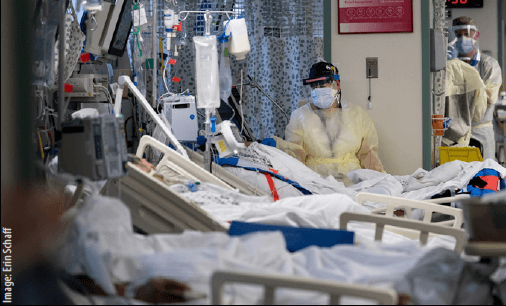 A single infusion of an experimental
drug markedly reduced levels of the
coronavirus in newly infected patients
and lowered the chances that they would
need hospitalization, the drug’s maker
announced on Wednesday. The drug is
a monoclonal antibody, a manufactured
copy of an antibody produced by a patient
who recovered from Covid-19, the
illness caused by the coronavirus. Many
scientists hope that monoclonal antibodies
will prove to be powerful treatments
for Covid-19, but they are difficult and
expensive to manufacture, and progress
has been slow.
The announcement, by Eli Lilly, was
not accompanied by detailed data;
independent scientists have not yet
reviewed the results, nor have they been
published in a peer-reviewed journal. ...
More than 450 newly diagnosed
patients received the monoclonal antibody
or a placebo infusion. Some 1.7%
of those who got the drug were hospitalized,
compared with 6% of those
who received a placebo —a 72% reduction
in risk. Levels of the coronavirus
plummeted among participants who
received the drug, and their symptoms
were fewer, compared with those who
got the placebo.
The treatments so far shown to help
coronavirus patients ... are intended
only for hospitalized patients. Those
with mild to moderate disease have had
to wait and hope for the best. ... Read full
text:
Read full text:
A single infusion of an experimental
drug markedly reduced levels of the
coronavirus in newly infected patients
and lowered the chances that they would
need hospitalization, the drug’s maker
announced on Wednesday. The drug is
a monoclonal antibody, a manufactured
copy of an antibody produced by a patient
who recovered from Covid-19, the
illness caused by the coronavirus. Many
scientists hope that monoclonal antibodies
will prove to be powerful treatments
for Covid-19, but they are difficult and
expensive to manufacture, and progress
has been slow.
The announcement, by Eli Lilly, was
not accompanied by detailed data;
independent scientists have not yet
reviewed the results, nor have they been
published in a peer-reviewed journal. ...
More than 450 newly diagnosed
patients received the monoclonal antibody
or a placebo infusion. Some 1.7%
of those who got the drug were hospitalized,
compared with 6% of those
who received a placebo —a 72% reduction
in risk. Levels of the coronavirus
plummeted among participants who
received the drug, and their symptoms
were fewer, compared with those who
got the placebo.
The treatments so far shown to help
coronavirus patients ... are intended
only for hospitalized patients. Those
with mild to moderate disease have had
to wait and hope for the best. ... Read full
text:
Read full text:
 When researchers in China were
analyzing hospital data of
patients with Covid-19, they noticed
an odd trend: Very few of the sick
patients regularly wore glasses.
In one hospital in Suizhou, China,
276 patients were admitted over a
47 day period, but only 16 patients —
less than 6 percent — had myopia or
nearsightedness that required them to
wear glasses for more than eight hours
a day. By comparison, more than 30
percent of similarly aged people in the
region needed glasses for nearsightedness,
earlier research had shown. ...
It may be that eyeglasses act as a
partial barrier, protecting eyes from
the splatter of a cough or sneeze.
Another explanation for the finding
could be that people who wear glasses
are less likely to rub their eyes with
contaminated hands. ...
The current study, published in JAMA
Ophthalmology, was accompanied by
a commentary from Dr. Lisa Maragakis,
an infectious disease specialist
and associate professor of medicine
at Johns Hopkins School of Medicine,
who urged caution in interpreting the
results. The study was small, involving
fewer than 300 cases, a tiny fraction ...
Read full text:
When researchers in China were
analyzing hospital data of
patients with Covid-19, they noticed
an odd trend: Very few of the sick
patients regularly wore glasses.
In one hospital in Suizhou, China,
276 patients were admitted over a
47 day period, but only 16 patients —
less than 6 percent — had myopia or
nearsightedness that required them to
wear glasses for more than eight hours
a day. By comparison, more than 30
percent of similarly aged people in the
region needed glasses for nearsightedness,
earlier research had shown. ...
It may be that eyeglasses act as a
partial barrier, protecting eyes from
the splatter of a cough or sneeze.
Another explanation for the finding
could be that people who wear glasses
are less likely to rub their eyes with
contaminated hands. ...
The current study, published in JAMA
Ophthalmology, was accompanied by
a commentary from Dr. Lisa Maragakis,
an infectious disease specialist
and associate professor of medicine
at Johns Hopkins School of Medicine,
who urged caution in interpreting the
results. The study was small, involving
fewer than 300 cases, a tiny fraction ...
Read full text:
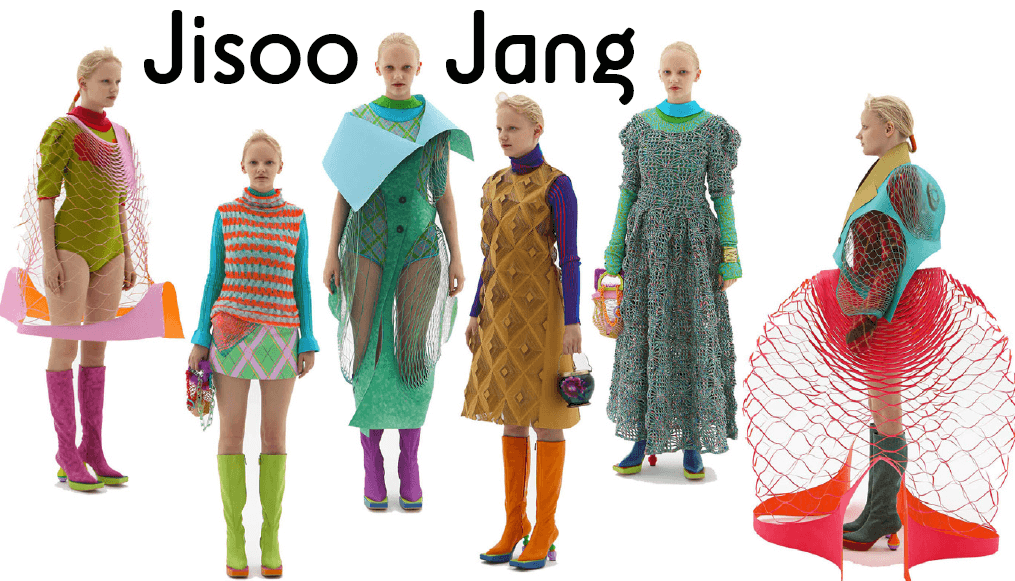 It was a growing love for textures and textiles that prompted Jisoo Jang, the 25
year old South Korean designer to apply to the BA Fashion Knitwear course at
Central Saint Martins. During her placement year, Jisoo interned at Kiko Kostadinov.
Her graduate collection explores her collector’s obsession for vases, flowers
and fragrances. Perfume is an omnipresent element in Jisoo’s everyday attire. She
applies the same art of flower arrangement in her own sense of dress, too; ‘I think
the invisible scent, mood, and emotion conjure up memories of the day.’ Six muses
were imagined, assuming that each vase was a character, wondering what they would wear and what scent matched best their personalities. Exaggerated volumes
reference the way objects come into contact and interact with the body in the art
works of Caroline Broadhead. Each garment has been executed with sustainable
techniques; zero waste pattern, laser cutting on washable paper and bio plastics
mixed with gelatine and Jesmonite.
—Josephine Giachero, BA (Hons) Fashion Journalism @je.suis.josephine
It was a growing love for textures and textiles that prompted Jisoo Jang, the 25
year old South Korean designer to apply to the BA Fashion Knitwear course at
Central Saint Martins. During her placement year, Jisoo interned at Kiko Kostadinov.
Her graduate collection explores her collector’s obsession for vases, flowers
and fragrances. Perfume is an omnipresent element in Jisoo’s everyday attire. She
applies the same art of flower arrangement in her own sense of dress, too; ‘I think
the invisible scent, mood, and emotion conjure up memories of the day.’ Six muses
were imagined, assuming that each vase was a character, wondering what they would wear and what scent matched best their personalities. Exaggerated volumes
reference the way objects come into contact and interact with the body in the art
works of Caroline Broadhead. Each garment has been executed with sustainable
techniques; zero waste pattern, laser cutting on washable paper and bio plastics
mixed with gelatine and Jesmonite.
—Josephine Giachero, BA (Hons) Fashion Journalism @je.suis.josephine
 The connection between food and
mental health is an increasingly
important topic in the wellness world,
but integrating nutrition into a trauma
recovery plan (or any kind of mental
health plan) still isn’t talked about often.
It’s one that UK nutrition therapist
and eating disorder recovery coach
Kaysha Thomas wishes people would
talk about more. ...
For someone working through
trauma, eating regular meals often falls
by the wayside, but when you aren’t fueling
your body regularly, Thomas says
it can further stress your body. “The
nervous system’s response to trauma
increases our need for both macro and
micro nutrients as these are being used
up at an increased rate to sustain the
flight, fight, or freeze response,” she tells Well+Good. However, irregular
meals send a signal to your brain that
food is scarce, which disrupts blood
sugar levels. The brain then releases
the stress hormone cortisol which
stimulates the release of glucose from
its energy stores to make up for the
disrupted blood sugar levels. But of
course, chronic levels of cortisol has a
trickle-down effect on the rest of the
body, making it harder to sleep, disrupting
digestion, and potentially even
impacting menstruation and other
crucial body systems.
Besides eating regular meals, Thomas
says it’s important to get enough
omega-3 fatty acids, magnesium, and
carbohydrates —yes, carbs!
The connection between food and
mental health is an increasingly
important topic in the wellness world,
but integrating nutrition into a trauma
recovery plan (or any kind of mental
health plan) still isn’t talked about often.
It’s one that UK nutrition therapist
and eating disorder recovery coach
Kaysha Thomas wishes people would
talk about more. ...
For someone working through
trauma, eating regular meals often falls
by the wayside, but when you aren’t fueling
your body regularly, Thomas says
it can further stress your body. “The
nervous system’s response to trauma
increases our need for both macro and
micro nutrients as these are being used
up at an increased rate to sustain the
flight, fight, or freeze response,” she tells Well+Good. However, irregular
meals send a signal to your brain that
food is scarce, which disrupts blood
sugar levels. The brain then releases
the stress hormone cortisol which
stimulates the release of glucose from
its energy stores to make up for the
disrupted blood sugar levels. But of
course, chronic levels of cortisol has a
trickle-down effect on the rest of the
body, making it harder to sleep, disrupting
digestion, and potentially even
impacting menstruation and other
crucial body systems.
Besides eating regular meals, Thomas
says it’s important to get enough
omega-3 fatty acids, magnesium, and
carbohydrates —yes, carbs!
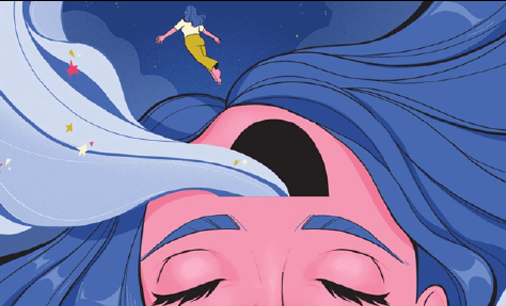 A new technique for lucid dreaming,
where people are aware they
are having a dream while they experience
it, has been verified. Although
the study began well before anyone
had heard of a new coronavirus, the
author thinks the timing is appropriate,
as lucid dreaming may be a big help
to those trapped in isolation due to
lockdown measures.
Many people have lucid dreams,
but most do so rarely. Several methods
have been proposed to help make
dreams like this more common, but
tests of their effectiveness have generally
not been very rigorous.
In 2018 Dr. Denholm Aspy of The
University of Adelaide tried to change
that with a study comparing several
techniques to induce lucid dreaming.
Aspy reported those using the
Mnemonic Induction of Lucid Dreams
(MILD) method had lucid dreams on
17% of nights when first practicing. This
was the best anyone had measured
without the assistance of supplements.
For a new study, Aspy randomly
allocated 355 volunteers to try five different
techniques or combinations, including
Senses Initiated Lucid Dream
(SSILD), a new method involving waking
after five hours and focusing attention
intensively for 20 seconds before
going back to sleep. In Frontiers in
Psychology, Aspy confirms his previous
success rate for MILD
A new technique for lucid dreaming,
where people are aware they
are having a dream while they experience
it, has been verified. Although
the study began well before anyone
had heard of a new coronavirus, the
author thinks the timing is appropriate,
as lucid dreaming may be a big help
to those trapped in isolation due to
lockdown measures.
Many people have lucid dreams,
but most do so rarely. Several methods
have been proposed to help make
dreams like this more common, but
tests of their effectiveness have generally
not been very rigorous.
In 2018 Dr. Denholm Aspy of The
University of Adelaide tried to change
that with a study comparing several
techniques to induce lucid dreaming.
Aspy reported those using the
Mnemonic Induction of Lucid Dreams
(MILD) method had lucid dreams on
17% of nights when first practicing. This
was the best anyone had measured
without the assistance of supplements.
For a new study, Aspy randomly
allocated 355 volunteers to try five different
techniques or combinations, including
Senses Initiated Lucid Dream
(SSILD), a new method involving waking
after five hours and focusing attention
intensively for 20 seconds before
going back to sleep. In Frontiers in
Psychology, Aspy confirms his previous
success rate for MILD
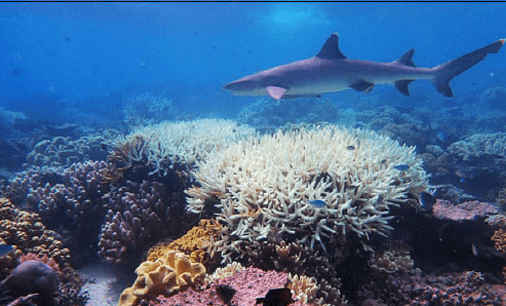 The world has failed to meet a
single target to stem the destruction
of wildlife and life-sustaining
ecosystems in the last decade, according
to a devastating new report from
the UN on the state of nature.
From tackling pollution to protecting
coral reefs, the international community
did not fully achieve any of the 20
Aichi biodiversity targets agreed in Japan
in 2010 to slow the loss of the natural
world. It is the second consecutive
decade that governments have failed
to meet targets. The Global Biodiversity
Outlook 5, published before a key UN
summit on the issue later this month,
found that despite progress in some
areas, natural habitats have continued
to disappear, vast numbers of species
remain threatened by extinction from
human activities, and $500bn (£388bn)
of environmentally damaging government
subsidies have not been eliminated.
Six targets have been partially
achieved, including those on protected
areas and invasive species. While
governments did not manage to protect
17% of terrestrial and inland water areas
and 10% of marine habitats, 44% of vital
biodiverse areas are now under protection,
an increase from 29% in 2000.
About 200 successful eradications of
invasive species on islands have also
taken place. ...
The UN’s biodiversity head, Elizabeth
Maruma Mrema, said humanity
was at a crossroads
Read full text:
The world has failed to meet a
single target to stem the destruction
of wildlife and life-sustaining
ecosystems in the last decade, according
to a devastating new report from
the UN on the state of nature.
From tackling pollution to protecting
coral reefs, the international community
did not fully achieve any of the 20
Aichi biodiversity targets agreed in Japan
in 2010 to slow the loss of the natural
world. It is the second consecutive
decade that governments have failed
to meet targets. The Global Biodiversity
Outlook 5, published before a key UN
summit on the issue later this month,
found that despite progress in some
areas, natural habitats have continued
to disappear, vast numbers of species
remain threatened by extinction from
human activities, and $500bn (£388bn)
of environmentally damaging government
subsidies have not been eliminated.
Six targets have been partially
achieved, including those on protected
areas and invasive species. While
governments did not manage to protect
17% of terrestrial and inland water areas
and 10% of marine habitats, 44% of vital
biodiverse areas are now under protection,
an increase from 29% in 2000.
About 200 successful eradications of
invasive species on islands have also
taken place. ...
The UN’s biodiversity head, Elizabeth
Maruma Mrema, said humanity
was at a crossroads
Read full text:
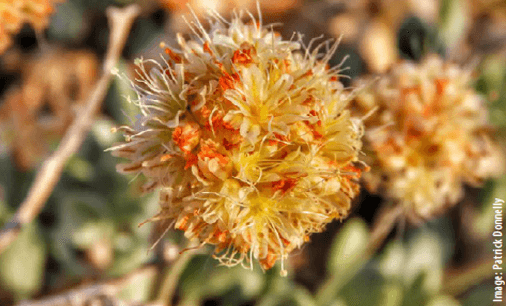 Conservationists discovered over
the weekend [Sept. 16] that someone
had dug up and destroyed more
than 17,000 Tiehm’s buckwheat plants,
a rare Nevada wildflower the U.S. Fish
and Wildlife Service said this summer
may warrant protection under the
Endangered Species Act. As much as
40% of the flower’s global population,
which exists on just 21 acres in western
Nevada, may have been destroyed.
“This is an absolute tragedy,” said Patrick
Donnelly, Nevada state director
at the Center for Biological Diversity.
“Tiehm’s buckwheat is one of the beautiful
gems of Nevada’s biodiversity and
some monster destroyed thousands of
these irreplaceable flowering plants.”
A routine visit to the site by Center
staff revealed substantial impacts to all
six subpopulations of the flower, with
some subpopulations nearly wiped
out. Plants were dug up or mangled
with shovels, with taproots cut and
most of the dead buckwheats hauled
off-site. ... Tiehm’s buckwheat has been
the subject of recent controversy. An
Australian mining company, Ioneer
Corp., has proposed an open-pit
lithium mine that would destroy the
vast majority of Tiehm’s buckwheat’s
habitat. ... “This appears to have been
a premeditated, somewhat organized,
large-scale operation aimed at wiping
out one of the rarest plants on Earth
Read full text:
Conservationists discovered over
the weekend [Sept. 16] that someone
had dug up and destroyed more
than 17,000 Tiehm’s buckwheat plants,
a rare Nevada wildflower the U.S. Fish
and Wildlife Service said this summer
may warrant protection under the
Endangered Species Act. As much as
40% of the flower’s global population,
which exists on just 21 acres in western
Nevada, may have been destroyed.
“This is an absolute tragedy,” said Patrick
Donnelly, Nevada state director
at the Center for Biological Diversity.
“Tiehm’s buckwheat is one of the beautiful
gems of Nevada’s biodiversity and
some monster destroyed thousands of
these irreplaceable flowering plants.”
A routine visit to the site by Center
staff revealed substantial impacts to all
six subpopulations of the flower, with
some subpopulations nearly wiped
out. Plants were dug up or mangled
with shovels, with taproots cut and
most of the dead buckwheats hauled
off-site. ... Tiehm’s buckwheat has been
the subject of recent controversy. An
Australian mining company, Ioneer
Corp., has proposed an open-pit
lithium mine that would destroy the
vast majority of Tiehm’s buckwheat’s
habitat. ... “This appears to have been
a premeditated, somewhat organized,
large-scale operation aimed at wiping
out one of the rarest plants on Earth
Read full text:
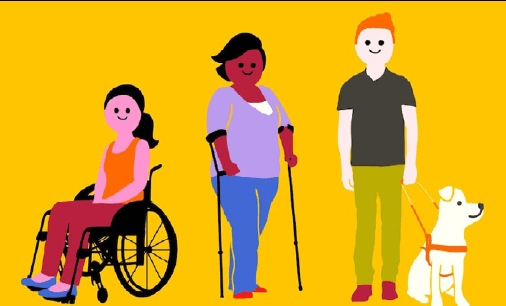 We live in a society designed with
the expectation that people are
able, neurotypical. Most people never
consider how those of us with disability,
chronic illness or neurodiversity
interact with the world around us.
Perhaps it’s not unrelated that according
to the most recent data, discrimination
on the grounds of disability topped
the list in terms of complaints made to
the Australian Human Rights Commission
—above that of racism and sexism.
These complaints, which can be difficult
to lodge, are the tip of an iceberg.
Yet if I drop the word ‘ableism’?
Silence. People who easily name racism
and sexism do not seem to see the human
rights issues that underscore ableism.
So that silence is problematic.
What is ableism? It is the favouring
of able neurotypical people, and the
exclusion and devaluation of people
who are disabled and neurodivergent.
Ableism may not be intentional (in
the same way that racism or sexism
may not be intentional) but that
doesn’t mean it’s not harmful. Take
the many media stories that often use
words that communicate the underlying
message we are a “burden” on
society. Think of all of the buildings,
spaces, places, events (and so on) that
were often designed without consideration
of the needs of people with disability.
Often we are the afterthought ...
Read full text:
We live in a society designed with
the expectation that people are
able, neurotypical. Most people never
consider how those of us with disability,
chronic illness or neurodiversity
interact with the world around us.
Perhaps it’s not unrelated that according
to the most recent data, discrimination
on the grounds of disability topped
the list in terms of complaints made to
the Australian Human Rights Commission
—above that of racism and sexism.
These complaints, which can be difficult
to lodge, are the tip of an iceberg.
Yet if I drop the word ‘ableism’?
Silence. People who easily name racism
and sexism do not seem to see the human
rights issues that underscore ableism.
So that silence is problematic.
What is ableism? It is the favouring
of able neurotypical people, and the
exclusion and devaluation of people
who are disabled and neurodivergent.
Ableism may not be intentional (in
the same way that racism or sexism
may not be intentional) but that
doesn’t mean it’s not harmful. Take
the many media stories that often use
words that communicate the underlying
message we are a “burden” on
society. Think of all of the buildings,
spaces, places, events (and so on) that
were often designed without consideration
of the needs of people with disability.
Often we are the afterthought ...
Read full text:
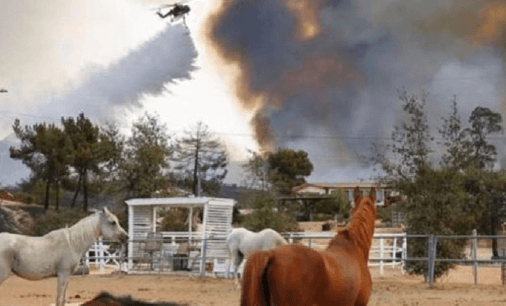 The wildfires that have ravaged the
west coast over the past two months
have burned millions of acres, claimed
over 30 lives, and forced thousands to
live in evacuation shelters. The fires
have also caused unimaginable damage
to the area’s wildlife.
“Some of these places we set aside
may be fundamentally impacted by
climate change and may not be able to
come back,” Amy Windrope, deputy
director of Washington’s Department of
Fish and Wildlife, said according to The
New York Times. Out of all the death
and destruction comes a wonderful story
out of Jamul, California, near San Diego.
Over twenty years ago, Patty Hyslop
started the Hyslop Horse Haven to care for abused and neglected horses. ...
The sanctuary also provides horseback
riding lessons for children.
On September 5, as the Valley Fire
raged through the area, forcing Hyslop
to evacuate her ranch, leaving the
horses behind. ... After the fire made its
way through the area, Hyslop returned
to her horse haven fearing the worst.
But she was shocked to find that all 20
of her horses survived. Unfortunately...
the entire sanctuary was reduced to
ash and debris. ... You can help rebuild
it, visit and donate here: https://www.
gofundme.com/f/valley-fire-horse-help
Read full text
The wildfires that have ravaged the
west coast over the past two months
have burned millions of acres, claimed
over 30 lives, and forced thousands to
live in evacuation shelters. The fires
have also caused unimaginable damage
to the area’s wildlife.
“Some of these places we set aside
may be fundamentally impacted by
climate change and may not be able to
come back,” Amy Windrope, deputy
director of Washington’s Department of
Fish and Wildlife, said according to The
New York Times. Out of all the death
and destruction comes a wonderful story
out of Jamul, California, near San Diego.
Over twenty years ago, Patty Hyslop
started the Hyslop Horse Haven to care for abused and neglected horses. ...
The sanctuary also provides horseback
riding lessons for children.
On September 5, as the Valley Fire
raged through the area, forcing Hyslop
to evacuate her ranch, leaving the
horses behind. ... After the fire made its
way through the area, Hyslop returned
to her horse haven fearing the worst.
But she was shocked to find that all 20
of her horses survived. Unfortunately...
the entire sanctuary was reduced to
ash and debris. ... You can help rebuild
it, visit and donate here: https://www.
gofundme.com/f/valley-fire-horse-help
Read full text

 An appealingly
chunky design that is made in Italy
by the rotational molding of polyethylene.
by Faye Toogood. store.moma.org
An appealingly
chunky design that is made in Italy
by the rotational molding of polyethylene.
by Faye Toogood. store.moma.org
 Anthropomorphic plant pals that have a dual purpose: to
cuddle with your little ones and brighten up their room. store.moma.or
Anthropomorphic plant pals that have a dual purpose: to
cuddle with your little ones and brighten up their room. store.moma.or
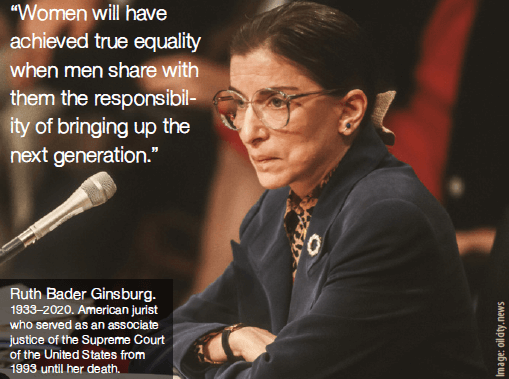 “Women will have
achieved true equality
when men share with
them the responsibility
of bringing up the
next generation
“Women will have
achieved true equality
when men share with
them the responsibility
of bringing up the
next generation
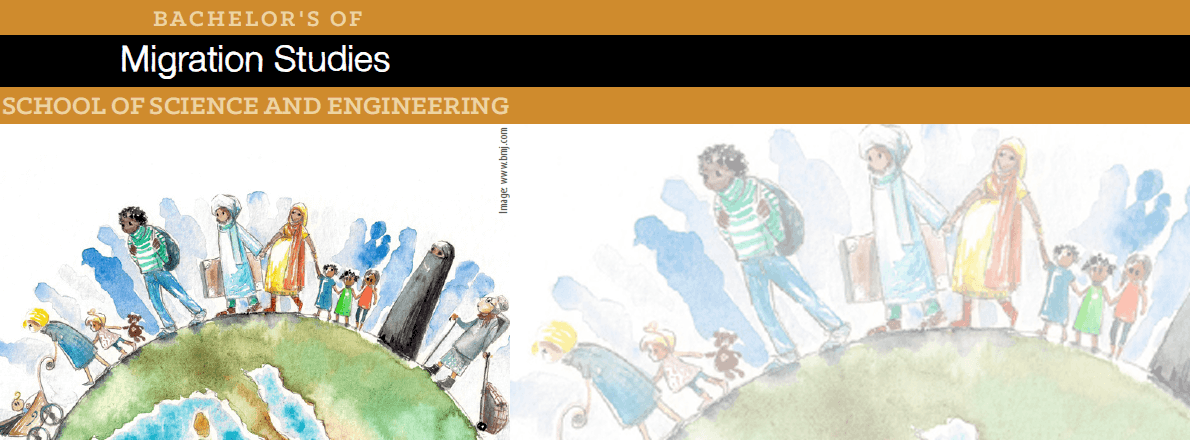 The Bachelor of Migration Studies
program is offered online via
distance learning. After evaluating
both academic record and life experience,
AIU staff working in conjunction
with Faculty and Academic Advisors
will assist students in setting up a
custom-made program, designed on
an individual basis. This flexibility to
meet student needs is seldom found
in other distance learning programs.
Our online program does not require
all students to take the same subjects/
courses, use the same books, or
learning materials. Instead, the online
Bachelor of Migration Studies curriculum
is designed individually by the
student and academic advisor.
It specifically addresses strengths
and weaknesses with respect to
development opportunities in the
student’s major and intended field of
work. Understanding that industry
and geographic factors should influence
the content of the curriculum
instead of a standardized one-fits-all
design is the hallmark of AIU’s unique
approach to adult education. This
philosophy addresses the dynamic and
constantly changing environment of
working professionals by helping adult
students in reaching their professional
and personal goals within the scope of
the degree program.
The Bachelor of Migration Studies
program is offered online via
distance learning. After evaluating
both academic record and life experience,
AIU staff working in conjunction
with Faculty and Academic Advisors
will assist students in setting up a
custom-made program, designed on
an individual basis. This flexibility to
meet student needs is seldom found
in other distance learning programs.
Our online program does not require
all students to take the same subjects/
courses, use the same books, or
learning materials. Instead, the online
Bachelor of Migration Studies curriculum
is designed individually by the
student and academic advisor.
It specifically addresses strengths
and weaknesses with respect to
development opportunities in the
student’s major and intended field of
work. Understanding that industry
and geographic factors should influence
the content of the curriculum
instead of a standardized one-fits-all
design is the hallmark of AIU’s unique
approach to adult education. This
philosophy addresses the dynamic and
constantly changing environment of
working professionals by helping adult
students in reaching their professional
and personal goals within the scope of
the degree program.
 Atlantic International University is accredited by the Accreditation Service for International
Schools, Colleges and Universities (ASIC). ASIC Accreditation is an internationally
renowned quality standard for colleges and universities. Visit ASIC’s Directory of Accredited
Colleges and Universities. ASIC is a member of CHEA International Quality Group
(CIQG) in the USA, an approved accreditation body by the Ministerial Department of the Home Office
in the UK, and is listed in the International Directory of the Council for Higher Education Accreditation
(CHEA). The University is based in the United States and was established by corporate charter in 1998.
Atlantic International University is accredited by the Accreditation Service for International
Schools, Colleges and Universities (ASIC). ASIC Accreditation is an internationally
renowned quality standard for colleges and universities. Visit ASIC’s Directory of Accredited
Colleges and Universities. ASIC is a member of CHEA International Quality Group
(CIQG) in the USA, an approved accreditation body by the Ministerial Department of the Home Office
in the UK, and is listed in the International Directory of the Council for Higher Education Accreditation
(CHEA). The University is based in the United States and was established by corporate charter in 1998.
 In some cases, accredited colleges
may not accept for transfer courses and degrees
completed at unaccredited colleges, and some
employers may require an accredited degree as
a basis for eligibility for employment. Potential
students should consider how the above may affect
their interests, AIU respects the unique rules and
regulations of each country and does not seek to
influence the respective authorities. In the event
that a prospective student wishes to carry out any
government review or process in regards to his
university degree, we recommend that the requirements
of such are explored in detail with the relevant
authorities by the prospective student as the
university does not intervene in such processes.
AIU students can be found in over 180 countries,
they actively participate and volunteer
in their communities as part of their academic
program and have allocated thousands of service
hours to diverse causes and initiatives. AIU
programs follow the standards commonly used by
colleges and universities in the United States with
regards to the following: academic program
structure, degree issued, transcript, and
other graduation documents.
AIU graduation documents can include
an apostille and authentication from the
US Department of State to facilitate their
use internationally.
In some cases, accredited colleges
may not accept for transfer courses and degrees
completed at unaccredited colleges, and some
employers may require an accredited degree as
a basis for eligibility for employment. Potential
students should consider how the above may affect
their interests, AIU respects the unique rules and
regulations of each country and does not seek to
influence the respective authorities. In the event
that a prospective student wishes to carry out any
government review or process in regards to his
university degree, we recommend that the requirements
of such are explored in detail with the relevant
authorities by the prospective student as the
university does not intervene in such processes.
AIU students can be found in over 180 countries,
they actively participate and volunteer
in their communities as part of their academic
program and have allocated thousands of service
hours to diverse causes and initiatives. AIU
programs follow the standards commonly used by
colleges and universities in the United States with
regards to the following: academic program
structure, degree issued, transcript, and
other graduation documents.
AIU graduation documents can include
an apostille and authentication from the
US Department of State to facilitate their
use internationally.
| Dr. Franklin Valcin President/Academic Dean |
Dr. José Mercado Chief Executive Officer Chairman of the Board of Trustees |
Ricardo González, PhD Provost |
| Dr. Ricardo Gonzalez Chief Operation Officer and MKT Director |
Linda Collazo Logistics Coordinator |
Dr. Silvia Restorff Academic Advisor |
| Dr. Miriam Garibaldi Viceprovost for Research |
Irina Ivashuk Alumni Association Coordinator |
Dr. Prakash Menon Academic Advisor |
| Clara Margalef Director of Special Projects of AIU |
Carlos Aponte Telecommunications Coordinator |
Dr. Nilani Ljunggren De Silva Academic Advisor |
| Juan Pablo Moreno Director of Operations |
David Jung Corporate/Legal Counsel |
Dr. Scott Wilson Academic Advisor |
| Paula Viera Director of Intelligence Systems |
Bruce Kim Advisor/Consultant |
Dr. Mohammad Shaidul Islam Academic Advisor |
| Felipe Gomez Design Director / IT Supervisor |
Thomas Kim Corporate/ Accounting Counsel |
Dr. Edgar Colon Academic Advisor |
| Daritza Ysla IT Coordinator |
Camila Correa Quality Assurance Coordinator |
Deborah Rodriguez Academic Tutor Coordinator |
| Nadeem Awan Chief Programming Officer |
Maricela Esparza Administrative Coordinator |
Cyndy Dominguez Academic Tutor Coordinator |
| Dr. Jack Rosenzweig Dean of Academic Affairs |
Chris Benjamin IT and Hosting Support |
Kinmberly Diaz Admissions Support Tutor |
| Dr. Edward Lambert Academic Director |
Mayra Bolivar Accounting Coordinator |
Amalia Aldrett Admissions Coordinator |
| Dr. Ariadna Romero Advisor Coordinator |
Roberto Aldrett Communications Coordinator |
Sandra Garcia Admissions Coordinator |
| Nadia Gabaldon Academic Coordinator |
Giovanni Castillo IT Support |
Jose Neuhaus Admissions Support |
| Jhanzaib Awan Senior Programmer |
Jaime Rotlewicz Dean of Admissions |
Junko Shimizu Admissions Coordinator |
| Leonardo Salas Human Resource Manager |
Dr. Mario Rios Academic Advisor |
Veronica Amuz Admissions Coordinator |
| Benjamin Joseph IT and Technology Support |
Michael Phillips Registrar’s Office |
Alba Ochoa Admissions Coordinator |
| Rosie Perez Finance Coordinator |
Rene Cordon Admissions Support |
Jenis Garcia Admissions Counselor |
| Chris Soto Admissions Counselor |
||
 The School of Business and Economics
allows aspiring and practicing
professionals, managers, and entrepreneurs
in the private and public sectors
to complete a self paced distance
learning degree program of the highest
academic standard.
The ultimate goal is to empower
learners and help them take advantage
of the enormous array of resources
from the world environment in order
to eliminate the current continuum of
poverty and limitations.
Degree programs are designed for
those students whose professional experience has been in business,
marketing, administration, economics,
finance and management.
The School of Business and Economics
allows aspiring and practicing
professionals, managers, and entrepreneurs
in the private and public sectors
to complete a self paced distance
learning degree program of the highest
academic standard.
The ultimate goal is to empower
learners and help them take advantage
of the enormous array of resources
from the world environment in order
to eliminate the current continuum of
poverty and limitations.
Degree programs are designed for
those students whose professional experience has been in business,
marketing, administration, economics,
finance and management.
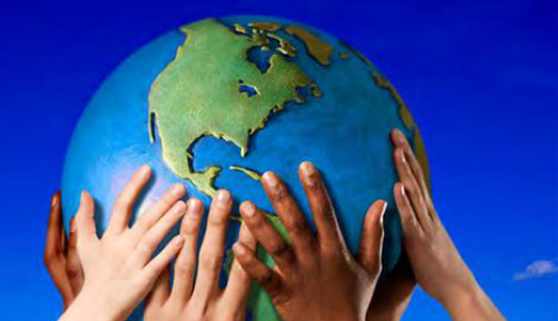 The School of Social and Human Studies
is focused on to the development of
studies which instill a core commitment
to building a society based on social and
economic justice and enhancing opportunities
for human well being.
The founding principles lie on the
basic right of education as outlined
in the Declaration of Human Rights.
We instill in our students a sense of
confidence and self reliance in their
ability to access the vast opportunities
available through information channels,
the world wide web, private, public,
nonprofit, and nongovernmental organizations in an ever expanding
global community.
Degree programs are aimed towards
those whose professional life has been
related to social and human behavior,
with the arts, or with cultural studies.
The School of Social and Human Studies
is focused on to the development of
studies which instill a core commitment
to building a society based on social and
economic justice and enhancing opportunities
for human well being.
The founding principles lie on the
basic right of education as outlined
in the Declaration of Human Rights.
We instill in our students a sense of
confidence and self reliance in their
ability to access the vast opportunities
available through information channels,
the world wide web, private, public,
nonprofit, and nongovernmental organizations in an ever expanding
global community.
Degree programs are aimed towards
those whose professional life has been
related to social and human behavior,
with the arts, or with cultural studies.
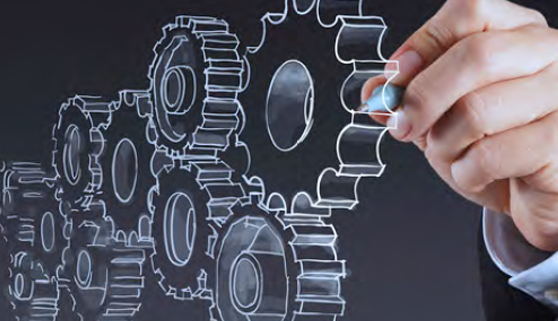 The School of Science and Engineering
seeks to provide dynamic, integrated,
and challenging degree programs
designed for those whose experience
is in industrial research, scientific production,
engineering and the general
sciences. Our system for research and
education will keep us apace with the
twenty-first century reach scientific
advance in an environmentally and
ecologically responsible manner to allow
for the sustainability of the human
population. We will foster among our
students a demand for ethical behavior,
an appreciation for diversity, an understanding
of scientific investigation, knowledge of design innovation, a
critical appreciation for the importance
of technology and technological change
for the advancement of humanity.
The School of Science and Engineering
seeks to provide dynamic, integrated,
and challenging degree programs
designed for those whose experience
is in industrial research, scientific production,
engineering and the general
sciences. Our system for research and
education will keep us apace with the
twenty-first century reach scientific
advance in an environmentally and
ecologically responsible manner to allow
for the sustainability of the human
population. We will foster among our
students a demand for ethical behavior,
an appreciation for diversity, an understanding
of scientific investigation, knowledge of design innovation, a
critical appreciation for the importance
of technology and technological change
for the advancement of humanity.
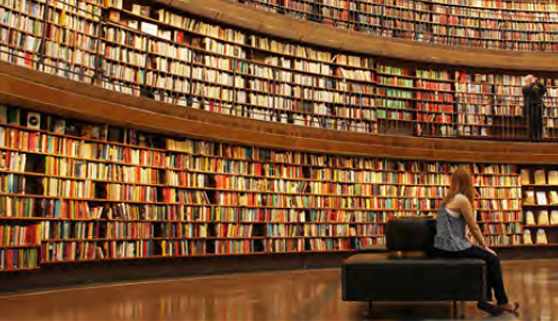 With access to a global catalog created and maintained collectively by more than
9,000 participating institutions, AIU students have secured excellent research
tools for their study programs.
With access to a global catalog created and maintained collectively by more than
9,000 participating institutions, AIU students have secured excellent research
tools for their study programs.